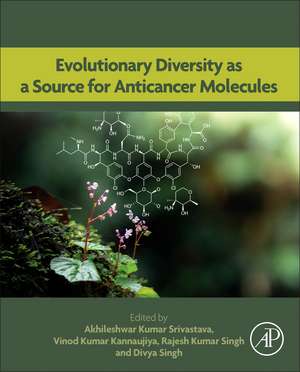Evolutionary Diversity as a Source for Anticancer Molecules
Editat de Akhileshwar Kumar Srivastava, Vinod Kumar Kannaujiya, Rajesh Kumar Singh, Divya Singhen Limba Engleză Paperback – 21 sep 2020
derived from invertebrates that can be used as part of cancer treatment.
Evolutionary Diversity as a Source for Anticancer Molecules also deals with some of the current challenges in the prevention of cancer as well as the side effects of conventional drugs used for cancer patients.
This book is a valuable resource for cancer researchers, oncologists, biotechnologists, pharmacologists, and any member of the biomedical
field interested in understanding more about natural products with anticancer potential.
- Discusses the application of natural products in place of conventional drugs to minimize the side effects in cancer treatment
- Explains the relation between evolutionary mechanisms and climate change for production of secondary metabolites
Preț: 742.79 lei
Preț vechi: 816.25 lei
-9% Nou
Puncte Express: 1114
Preț estimativ în valută:
142.17€ • 147.86$ • 119.14£
142.17€ • 147.86$ • 119.14£
Carte tipărită la comandă
Livrare economică 06-20 martie
Preluare comenzi: 021 569.72.76
Specificații
ISBN-13: 9780128217108
ISBN-10: 0128217103
Pagini: 390
Ilustrații: 60 illustrations (20 in full color)
Dimensiuni: 191 x 235 mm
Editura: ELSEVIER SCIENCE
ISBN-10: 0128217103
Pagini: 390
Ilustrații: 60 illustrations (20 in full color)
Dimensiuni: 191 x 235 mm
Editura: ELSEVIER SCIENCE
Public țintă
Cancer researchers, bioinformaticians, molecular biologists, medicinal chemists, pharmacistsCuprins
Preface1. Evolutionary mechanism for biosynthesis of diversemolecules2. Impact of ploidy changes on secondary metabolitesproductions in plants3. Effect of climate change on plant secondary metabolism:An ecological perspective4. Isolation and characterization of bioactive compounds fromnatural resources: Metabolomics and molecular approaches5. Single-celled bacteria as tool for cancer therapy6. Metabolic pathways for production of anticancercompounds in cyanobacteria7. Prophyletic origin of algae as potential repository ofanticancer compounds8. Metabolic versatility of fungi as a source for anticancercompounds9. Structural information of natural product metabolites inbryophytes10. Landscape of natural product diversity in land-plants assource for anticancer molecules11. Anticancer natural product from marine invertebrates12. Melatonin: A scientific journey from the discoveryin bovine pineal gland to a promising oncostatic agent:An evolutionary perspective13. Spice up your food for cancer prevention: Cancerchemo-prevention by natural compounds fromcommon dietary spices14. Significance of nutraceuticals in cancer therapy15. Common techniques and methods for screening of naturalproducts for developing of anticancer drugsIndex
